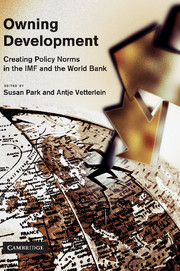Book contents
- Frontmatter
- Contents
- List of figures
- List of tables
- List of contributors
- Preface and acknowledgements
- List of acronyms and abbreviations
- Part One Introduction
- Part Two Norm emergence
- Part Three Norm stabilization
- 5 Lacking ownership: the IMF and its engagement with social development as a policy norm
- 6 Stabilizing global monetary norms: the IMF and current account convertibility
- 7 Bitter pills to swallow: legitimacy gaps and social recognition of the IMF tax policy norm in East Asia
- Part Four Norm subsiding
- Part Five Conclusion
- Bibliography
- Index
5 - Lacking ownership: the IMF and its engagement with social development as a policy norm
Published online by Cambridge University Press: 02 December 2010
- Frontmatter
- Contents
- List of figures
- List of tables
- List of contributors
- Preface and acknowledgements
- List of acronyms and abbreviations
- Part One Introduction
- Part Two Norm emergence
- Part Three Norm stabilization
- 5 Lacking ownership: the IMF and its engagement with social development as a policy norm
- 6 Stabilizing global monetary norms: the IMF and current account convertibility
- 7 Bitter pills to swallow: legitimacy gaps and social recognition of the IMF tax policy norm in East Asia
- Part Four Norm subsiding
- Part Five Conclusion
- Bibliography
- Index
Summary
Introduction
By the end of the 1990s social, instead of narrowly defined economic, development had become a global policy norm. The development order of the 1980s was marked by a consensus that fostered development policies based on classical economic theory; yet the emphasis on economic policies began to crack over the course of the 1990s. Early in that decade the United Nations (UN) was already promoting a human development approach based on Sen's idea that development is primarily about people not economics (Sen 2001). The World Bank followed these footsteps in the mid-1990s, setting up new policy initiatives and organizational reforms such as the Comprehensive Development Framework or the Strategic Compact that significantly enhanced the social development agenda inside the organization and refocused its objective towards poverty reduction. The IMF lagged behind these developments but joined the new spirit in 1999 by signing the Bank's Poverty Reduction Strategy Paper (PRSP) initiative. This was the first time in its history that the Fund officially endorsed poverty reduction as one of its priority objectives. It also acknowledged the benefits of social policies for economic development. Yet to what extent has the Fund internalized this new social development policy norm?
By tracing the evolution of the Fund's approach to social development policies from the late 1970s until today it becomes clear that the organization has not been at the forefront of promoting this policy norm and has always been reluctant to accommodate it into its operations.
- Type
- Chapter
- Information
- Owning DevelopmentCreating Policy Norms in the IMF and the World Bank, pp. 93 - 112Publisher: Cambridge University PressPrint publication year: 2010
- 19
- Cited by

